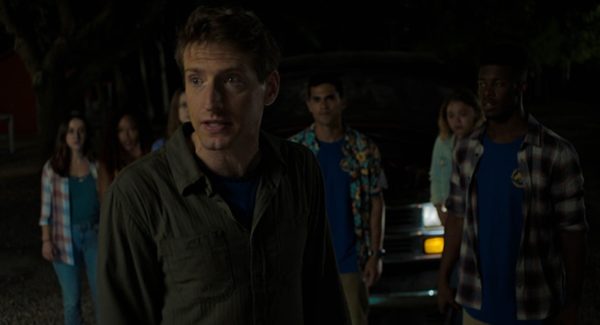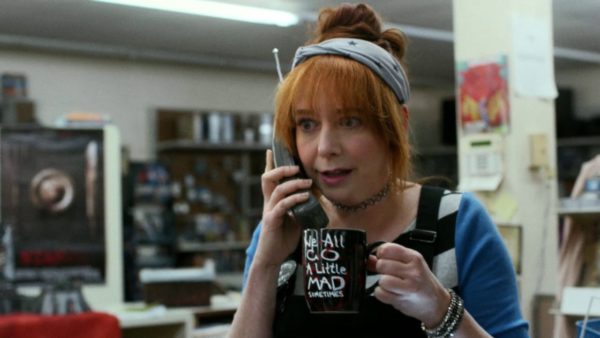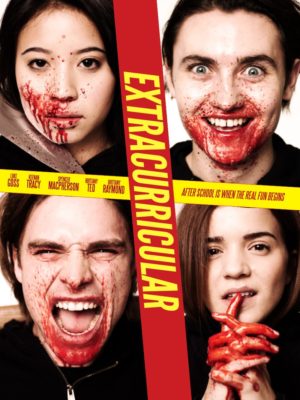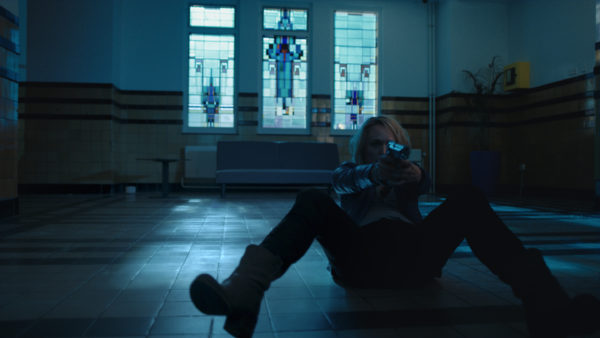
While Kevin Williamson and Wes Craven certainly didn’t invent the self-referential horror film, due to its pop culture footprint Scream has become a natural point of comparison for every post-1996 metatextual horror film. More than twenty years ago Sidney Prescott and Ghostface grossed $100M+ and, in the process, redefined the way that audiences — and filmmakers — considered how horror films are constructed. The proliferation of self-aware horror films in the 00s and 10s reflects this change (for better or worse) as it is now considered fair game to have characters acknowledge their predicament with a knowing wink to the audience, even while they run around screaming and dying.
Enter Brett Simmons‘ new horror-comedy, You Might Be The Killer, a film that gleefully comments on the tropes of the first cycle of 80s slasher films, even as it aims to replicate them, all while adopting an intriguing non-linear narrative structure that jumps back and forth in time. Although the film fails to stand on its own two feet by offering something new and unexpected, writers Simmons, Thomas P. Vitale and Covis Berzoyne do a good job of constructing a film that honours the conventions of the subgenre while simultaneously referencing and abiding by them.
You Might Be The Killer begins in media res as camp director Sam (Fran Kranz) calls his best friend Chuck (Alyson Hannigan) in the middle of a massacre. He quickly explains that the majority of the camp counsellors have been murdered by a bone-machete wielding masked man and that he has barricaded himself inside a cabin in the hopes of staying alive. Chuck is a video store employee and Sam’s go-to horror movie expert so he enlists her help in figuring out how best to survive. Thus begins a loose sort of bracketing device in which Chuck asks Sam questions to uncover the events that unfolded, which prompts the narrative to double back on itself (often using a title card indicating the number of dead counsellors to help audiences keep track of the timeline).
Although the film initially plays up the mystery of the killer’s identity, the film’s title a dead giveaway as to who is responsible. After a brief period, Simmons, Vitale and Berzoyne lay their cards on the table and acknowledge that Sam has been murdering his employees in a kind of fugue state; at this point the focus of You Might Be The Killer shifts from the mystery of “who” is the killer to the “why” the murders are happening, as well as “how” Sam can survive his situation. Throughout this process, Chuck reiterates the rules of the slasher genre according to its most popular entries (all while impressively manning the register and sassing customers who eavesdrop of the phone call).

Despite its meta elements, I would argue that the closest comparable film is not Scream, but 2015’s The Final Girls. Both films gently mock and play with the conventions of the slasher film while stringently adhering to them. Admittedly The Final Girls has a great deal more heart (and gender politics) working in its favour, but both films are fun, spirited endeavours that have a breezy vibe to them, thanks to a winsome cast.
The success of You Might Be The Killer is 100% thanks to Kranz and Hannigan. The two actors bring a great deal of audience goodwill from their various Joss Whedon projects to the production and their warm, empathetic screen presence helps engender audience investment. Even after it is revealed that Sam is the killer, Kranz manages to make him sympathetic and likeable. Hannigan arguably has the more challenging role of the two, given that she is divorced from all of the action; even stranded in a single video store set and forced to act all of her scenes on the phone, she’s a sheer delight. She infuses Chuck’s know-it-all, chipper, informative exposition with charm, easily making Chuck one of the highlights of the film.
Alas, despite the two strong performances anchoring the film, You Might Be The Killer peters out around the one hour mark. After a while it becomes clear that the film is using the self-referential material to prop itself up, and doesn’t have much else to offer. Little work is done to invest the other counsellors with distinct personalities, so watching the nearly dozen murders proves to be a rote exercise (even if the gore and the direction is ably and enthusiastically executed).
Ultimately You Might Be The Killers overstays its welcome and sputters to a (foregone) conclusion that relies too much on unearned audience investment in secondary characters who are little more than types. No matter how amusing the callbacks to 80s slashers are or how strong the two lead performances are, You Might Be The Killer still winds up feeling a little empty.
3.5/5



